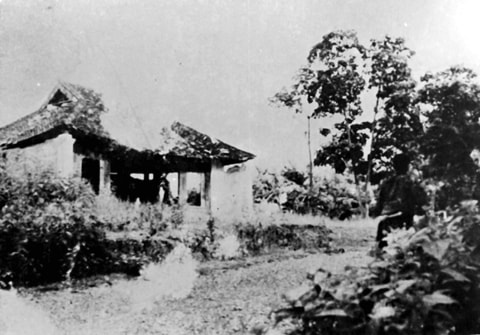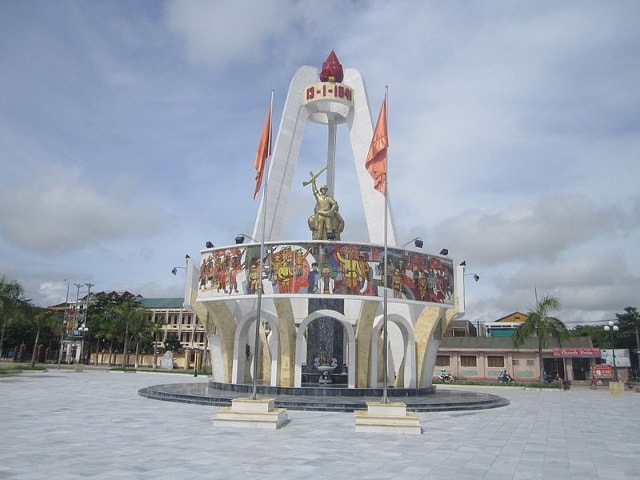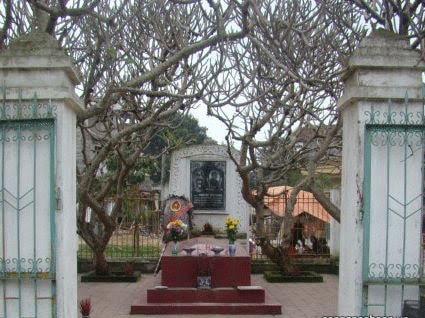Doi Cung - leader of Do Luong uprising
(Baonghean.vn) - The Do Luong uprising took place on January 13, 1941, led by Doi Cung and soldiers from Cho Rang and Thanh Chuong stations. They advanced to occupy Do Luong station, killed the station chief, and then advanced with 25 soldiers at night with the aim of occupying Giam Vinh Thanh Nghe An camp and then expanding to other places.
The Archers' real name was Nguyen Van Cung. In 1926, Nguyen Van Cung was forced to join the army in blue uniforms and stationed at Bim Son station, Thanh Hoa province. In 1930-1931, to suppress the Soviet-Nghe Tinh uprising that was spreading everywhere, Nguyen Van Cung's unit was transferred from Thanh Hoa to station at Kim Nhan station, Anh Son district.
After the Soviet - Nghe Tinh movement, the Cung Team was assigned to Vinh to protect the inner city of the French colonialists and the feudal lackeys of the Southern Dynasty. The Cung Team lived uprightly, sincerely, and often defended their comrades and those in difficulty and misfortune, so they were highly respected by their comrades.
As a forced soldier, eating rice and wearing clothes provided by the French colonialists, having to go out every day to suppress revolutionary movements in the localities, Nguyen Van Cung was heartbroken and indignant at the sight of innocent people dying just because they stood up against the harsh regime of the feudal colonialists, to protect the legitimate right to life of human beings. Yet they were charged with rebellion. The "military movement" policy of our Party from the height of the Soviet - Nghe Tinh movement attracted soldiers to participate in the anti-war movement, to escape and even more so, to return to the people, to join the revolutionary ranks. Mr. Mang Dan, a legionnaire who became an insider for the Communist Party in Vinh prison, was an example for Nguyen Van Cung to think about.
 |
| The headquarters of the Cung Team is in Rang market, Thanh Chuong. |
On January 8, 1941, the opportunity came, that was when Nguyen Van Cung was promoted to captain to replace the French garrison commander, Alongdo, who was stationed at Rang garrison in Thanh Chuong district, responsible for controlling both Thanh Chuong and Do Luong districts. After taking office for 5 days, Nguyen Van Cung seized the opportunity, led troops to Do Luong to inspect and he declared an uprising.
At 8:30 p.m. on January 13, 1941, Nguyen Van Cung and his soldiers arrived at Anh Son Palace (now Do Luong district town). After giving his brothers dinner, Captain Cung gathered his soldiers in the temple yard. The content and reason for the uprising were prepared by Captain Cung in advance, written on a piece of paper in his breast pocket. When all his brothers were gathered, he took out the paper to read, declared the uprising and assigned tasks to the soldiers. The soldiers would kill Bach, the Do Luong station chief, then get in a car and drag him back to Vinh city to kill the French colonialists, including notoriously cruel men, holding key positions such as: Inspector, Envoy, Deputy Envoy...
In Do Luong, the Cung Team cut all communication lines at the post office, destroyed the telephone and telegraph machines, and then divided into two groups. Group 1, led by Cung Team, went to kill the station chief Bach. Group 2 was responsible for killing the station chief, Rosai, then entered the government office to kill the district chief.
Cung's team returned to Rang station to kill the French ranger named Lodagia, then sent 25 soldiers back to Vinh, took the car of the ranger chief and two private cars to lead the troops back to Vinh. When passing Cam bridge, he ordered the soldiers to cut all the telephone wires across the bridge and gathered 5 more soldiers here to get in the car to go with them, with the purpose of liberating Vinh citadel.
 |
| Do Luong Mutiny Memorial in Do Luong Town. |
Soldiers arrived in Vinh at 4:00 a.m. on January 14, 1941. The insurgents gathered in front of the Vinh National School. The Cung team assigned the troops to advance: Cai Vi led the soldiers to wait behind the citadel. Meanwhile, the Cung team and Cai A used cars to advance straight into the citadel. The Cung team told the station chief on duty to ask to meet with the guard Detxiu to report the incident, the two posts of Rang and Do Luong had been taken by the communists. The person on duty let him in and kept Cai A there.
Because he knew the way around, Captain Cung went straight to the bedroom, woke up the soldiers, and reported that his forces had surrounded the city. He called on the soldiers to kill the guard inside. While the work was in progress, gunfire outside woke up Desxiu before Captain Cung could act.
Seeing the unfavorable situation, Doi Cung climbed over the wall to the outside. Behind, Cai Vi saw the commotion and led his soldiers to hide in Diec pagoda. The French colonialists sent African soldiers and secret agents to search everywhere inside and outside Vinh city and they captured all the soldiers. As for Cai A, after being captured, he refused to submit, refused to confess, he committed suicide to keep his integrity and patriotism as a resistance soldier.
As for Doi Cung, after escaping the city, he hid in a mountain cave for nearly a month. On February 11, 1941, he returned to the suburbs to check on the situation. Because of a traitor, he was arrested when he entered Tong Gia Liem's house in the Gate area.
 |
| Tomb of Doi Cung in Doi Cung ward (Vinh city). |
On February 20, 1941, the French Military Court in Hanoi opened a trial of 51 people who participated in the uprising. 11 people were sentenced to death, 12 to life in prison, 2 to 20 years of hard labor, 7 to 15 years in prison, 1 to 12 years in prison...
On April 25, 1941, the French colonialists executed him in three places: Vinh, Cho Rang and Do Luong.
On the day the French colonialists carried out the death penalty, the revolutionary bases - the Indochinese Communist Party - distributed leaflets throughout the regions (North, Central and South) to support and praise the spirit of the uprising soldiers. Leaflets were distributed in factories, cities, rural areas and even in military camps.
After the August Revolution in 1945, Nguyen Van Cung was posthumously awarded the title: Meritorious to the country by the Government of the Democratic Republic of Vietnam. The Fatherland honored his merit on his grave where he was executed at Gate Chot, Vinh city with his comrades./.
Peace
(Synthetic)
| RELATED NEWS |
|---|
